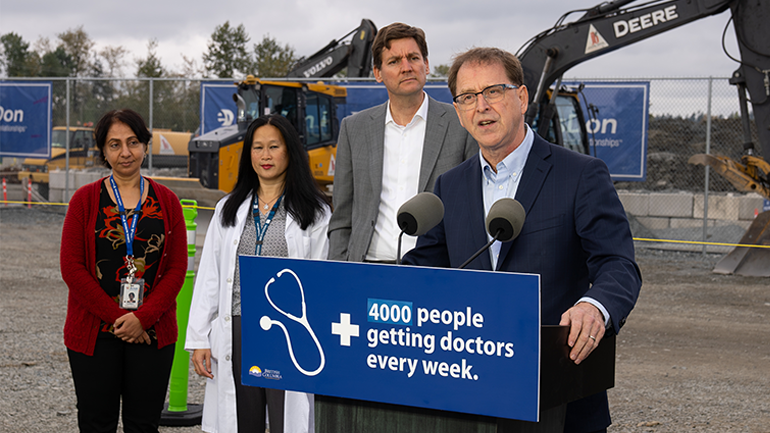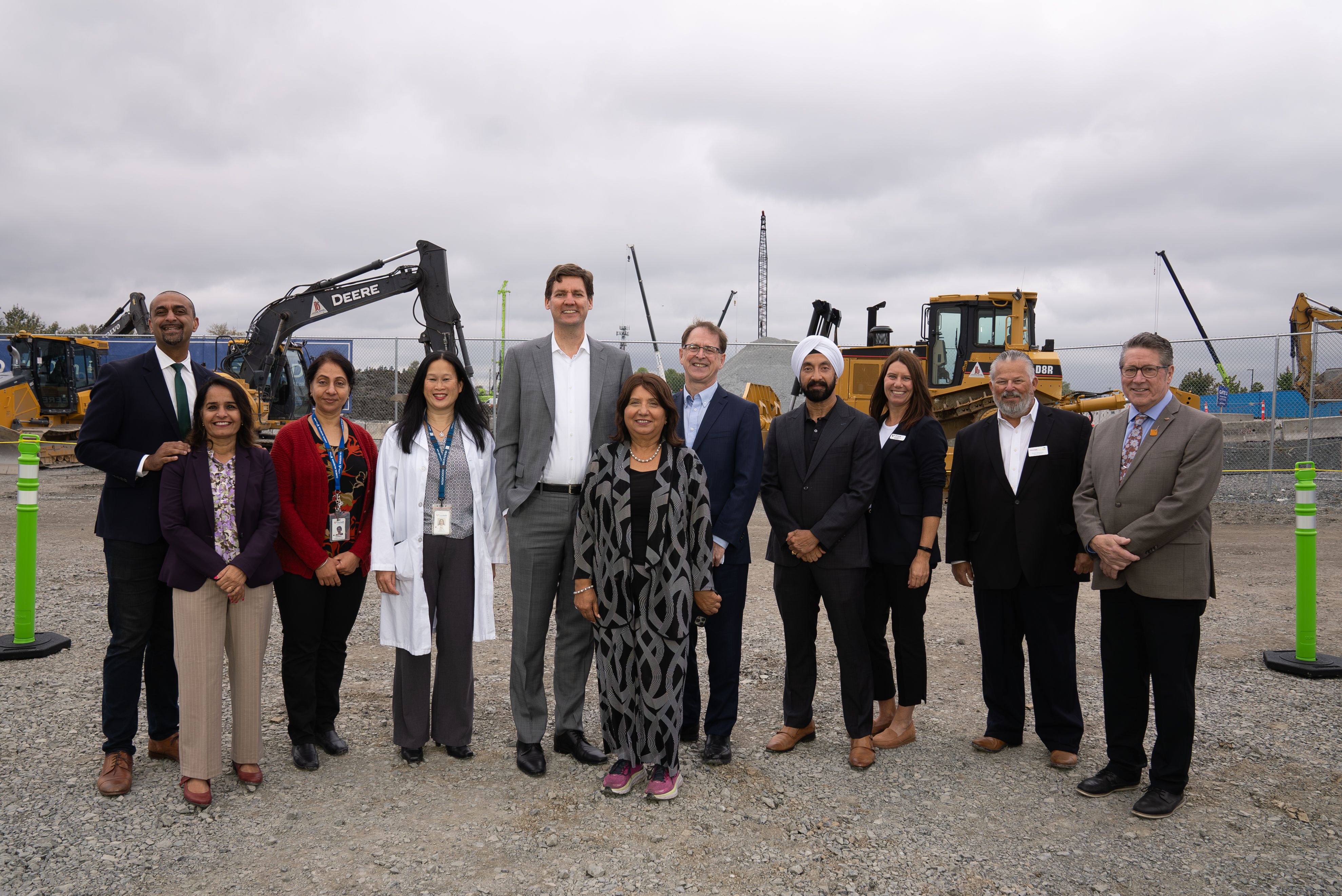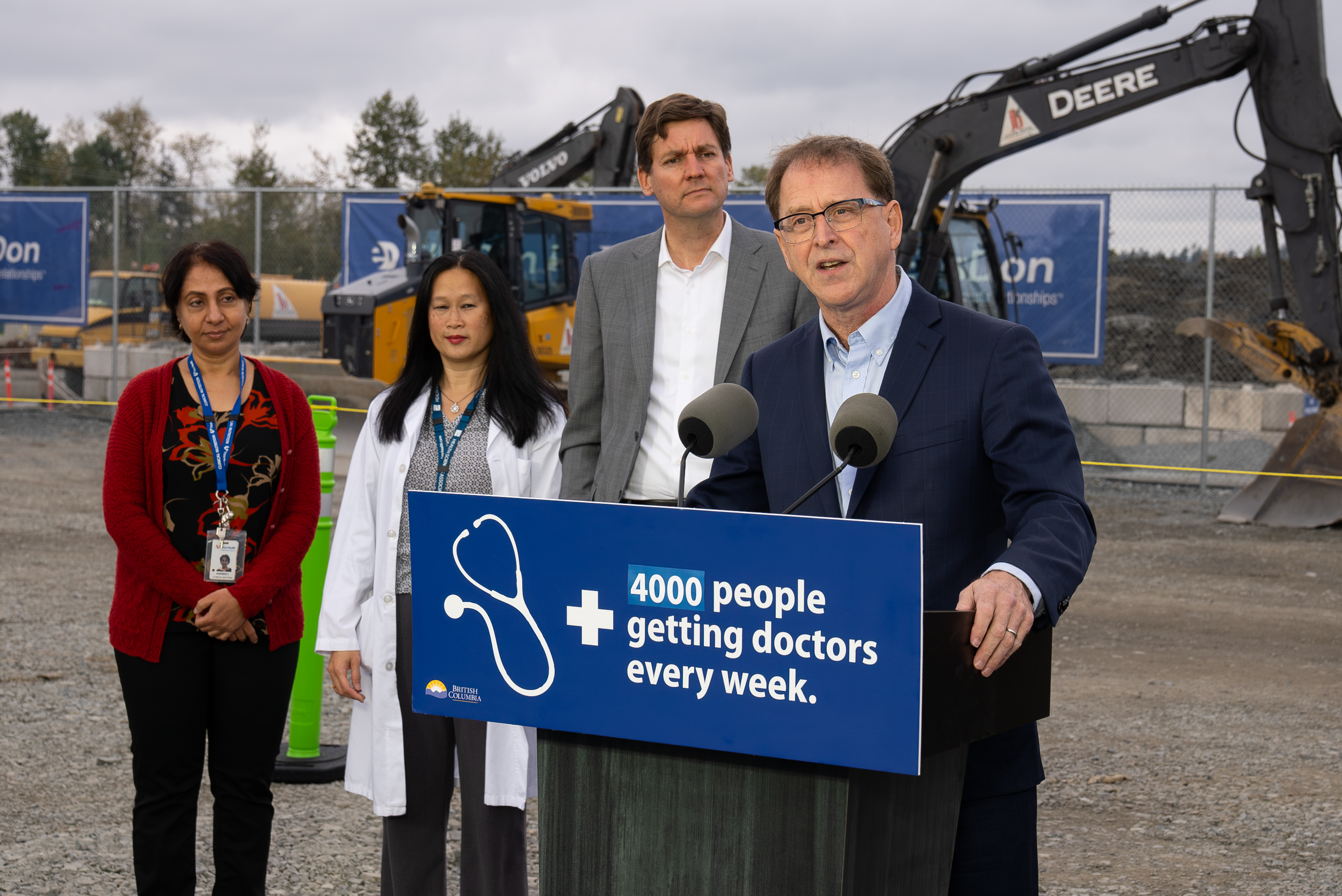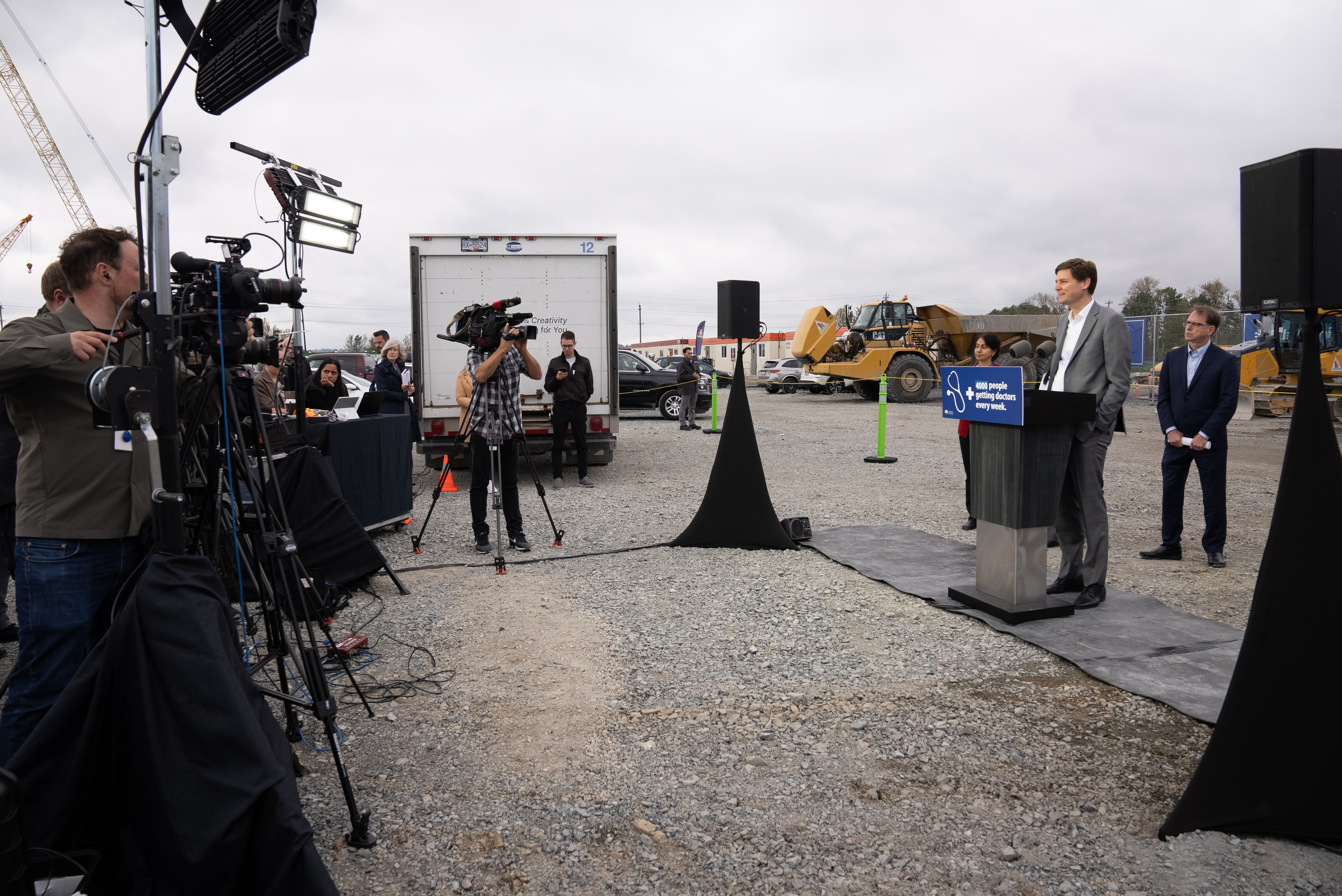
More than 248,000 people have been connected to a family doctor or nurse practitioner since the Health Connect Registry launched provincewide in July 2023.
Hundreds more people are getting matched every day. In total, more than 570,000 people have been connected to a family doctor or nurse practitioner since the launch of the primary-care strategy in 2018.
B.C. has also added 835 new primary-care family doctors who are taking on patients since launching its new physician pay model in February 2023, all part of strong actions to recruit thousands of health care workers and connect people to the care they need.
"We want B.C. to be a place where health care is always there for you, which is why we're taking action to hire more family doctors and health professionals than ever before," said Premier David Eby. "We're starting to see some good results, but there's a lot more we need to do. We can't afford to slash health care budgets when we need to be hiring even more doctors and nurses so B.C. families get the care they need when they need it."
The pace of matches through the Health Connect Registry is accelerating following improvements implemented in April 2024. At this time, around 4,000 people per week are connected to a family doctor, which is up from 2,700 per week at the same time last year, a 52 per cent increase. It is expected that about 160,000 more people will be matched in the next six months.
"To meet growing demand for health care services driven by B.C.'s aging and growing population, as well as a global shortage of care providers, we are investing in a multi-front approach that supports the people who need care and the health-care providers who offer it," said Adrian Dix, Minister of Health. "With the work we're doing, more of our neighbours and loved ones are getting high-quality care that's closer to home."
The Province continues to look for new ways to support the recruitment and retention of health professionals. In partnership with Fraser Health Authority, the Province has also identified a new BC Builds site in Surrey to deliver rental homes prioritized for nurses and health care workers and their families. The site is near the second hospital being built in Surrey and will allow workers to live close to where they work.
"Delivering homes for the people who provide the services we rely on and drive our economy forward is why we launched BC Builds," said Ravi Kahlon, Minister of Housing. "Through this BC Builds initiative, we will be able to build first-of-its-kind housing to help health care workers and their families find homes they can afford, and help people get the health care they need."
These homes are part of a $19 billion housing investment by the B.C. government. Since 2017, the Province has more than 84,000 homes that have been delivered or are underway for people in B.C., including nearly 1,900 in Surrey.
Increasing access to primary care for people in the province is part of the primary-care strategy launched in 2018. Recruiting, retaining and training more health-care workers is part of B.C.'s Health Human Resources Strategy launched in 2022.
Quotes
Dr. Ahmer Karimuddin, president, Doctors of BC –
"Increasing access to family doctors for thousands of British Columbians will drive better health outcomes. Improving our primary-care system through strategies like the Health Connect Registry and the longitudinal family physician (LFP) payment model for community-based and facility-based care help to ensure that patients can receive timely and consistent care. These are significant steps toward healthier communities for everyone."
Scott Wheatley, executive director, Cloverdale District Chamber of Commerce –
"The positive impact of new homes next to the hospital on the business community cannot be overstated. By offering new residents the opportunity to establish roots and live, work and play locally, this project will help Cloverdale thrive. With Surrey's rapidly growing population, this development is a win all around."
Quick Facts
- B.C. is also doing more to attract and train health professionals and making it quicker and easier to get international credentials recognized.
- Since January 2023, 1,355 internationally educated doctors and 1,319 internationally educated nurses have received full or provisional registration.
Learn More
To learn more about B.C.͛s actions to strengthen health care, visit: https://strongerbc.gov.bc.ca/health-care/.
To read about B.C.͛s Health Human Resources Strategy, visit: https://news.gov.bc.ca/files/BCHealthHumanResourcesStrategy-Sept2022.pdf.
To learn about the Province's primary-care strategy, visit: https://www2.gov.bc.ca/gov/content/health/accessing-health-care/bcs-primary-care-system.
To sign up to be matched with a family doctor or nurse practitioner on the Health Connect Registry, visit: https://www.healthlinkbc.ca/health-connect-registry.
To learn more about B.C.͛s actions to deliver more homes for people, visit: https://strongerbc.gov.bc.ca/Housing.
To learn more about the BC Builds program, visit: https://bcbuildshomes.ca.
Two backgrounders follow.
Backgrounders
What to know about primary-care strategy update
- Since announcing the primary-care strategy in 2018, at least 570,000 more people have a family doctor or nurse practitioner, with thousands more getting matched every week.
- People are getting connected to family doctors and nurse practitioners much quicker. Since the Health Connect Registry launched provincewide in July 2023, along with further
improvements to speed up the process in April 2024:
- 248,511 people have been matched to a family doctor or nurse practitioner since July 2023, which is 90,000 more matches since system improvements were made in April 2024;
- 588 people are now matched every day on average, up from 386 per day for the same time last year, a 52 per cent increase; and
- It is expected that approximately 160,000 more people will be matched in the next six months.
- B.C. is welcoming new doctors and nurses quicker than other provinces. B.C. has added:
- 835 new family doctors practicing longitudinal care since launching the new pay model in February 2023, bringing the total family doctors practicing longitudinal care in B.C. to 5,452;
- B.C. has the most family doctors per capita of all provinces;
- 3,076 more doctors of all types since 2017, bringing the total doctors in B.C. to 15,338. B.C. is tied for the highest ratio of doctors in Canada with Nova Scotia;
- 14,212 new nurses registered since January 2023, bringing the total nurses registered in all categories in B.C. to 72,082, the second quickest overall nursing workforce growth in Canada behind Prince Edward Island; and
- 637 more nurse practitioners since 2017, bringing the total to 1,152, more than double since 2017.
- B.C. is making sure people can access primary care closer to home. Since 2017, B.C. has announced:
- 50 urgent and primary care centres (UPCC) underway (39 open, 11 more by end of 2025, including in Kamloops, North Shore, Elkford and Surrey-Cloverdale) to provide timely primary care and urgent and after-hours care for non-emergency issues, such as sprains and wounds, relieving pressure on hospitals;
- there's been approximately three million patient visits to UPCCs so far;
- 86 primary-care networks underway so people can get co-ordinated care from a team of health providers within their community;
- 16 community health centres are open or in implementation, including in Lower Columbia, delivering primary care and a range of social services in one location; and
- 15 First Nations primary-care centres underway, plus three nurse practitioner-led clinics and a variety of virtual services are already open.
- B.C. is making it quicker and easier to access care for common illnesses at local pharmacies. Since expanding pharmacists' scope of practice in June 2023, more than 442,000 people have seen a pharmacist for care, including:
- 374,000 people treated for 21 minor ailments, such as pink eye and UTIs, relieving pressure on doctors' offices and hospitals;
- 68,000 people assessed to get a prescription for birth control; and
- overall, more than 269,000 people have gotten free contraceptives since April 2023.
- B.C. is doing more to attract health professionals and making it quicker and easier to recognize international credentials:
- 1,355 international medical graduates and 1,319 internationally educated nurses have received full or provisional registration with their respective regulatory colleges since January 2023;
- 280 physicians have signed on to the new-to-practice incentive program, which offers a competitive service contract with a signing bonus and loan forgiveness payments for recent graduates who choose to provide primary care;
- 288 nurses have joined a pool of Go Health Nurses (publicly funded travel nurses) ready to travel to rural and remote communities to provide care and they have provided 170,000 hours of nursing care in 29 communities since January 2024; and
- 1,300 people have been hired into the Health Career Access Program since March 2024 (9,000 in total) to gain non-clinical experience in various health-care settings while training to become a health care assistant.
- B.C has increased post-secondary seats so more people can train for future health care careers closer to home:
- 40 new medical student and 59 residency seats added in the past two years, with more to come when the new medical school in Surrey opens in 2026 - the first new school to open in western Canada in 50 years;
- 602 new nursing training seats since 2017, bringing the total to 2,751;
- additionally, there are as many as 1,000 advanced training opportunities in specialty areas, such as acute and post-operative care; and
- 22 new allied health professional seats in the past three years in areas like radiation therapists, lab assistants, pharmacy technicians and social workers.
What to know about BC Builds homes for health-care workers in Surrey
A new site next to the new Surrey hospital has been identified to deliver homes that will be prioritized for health care workers and staff who provide the care people count on. This site is a result from a partnership between the Province, through BC Builds at BC Housing, and Fraser Health.
The site is located at 18050 James Hill Dr., near the second hospital being built in Surrey, and will allow workers to live close to where they work.
BC Builds homes have a goal of ensuring households with middle incomes are spending no more than 30 per cent of their income on rent. Additionally, at least 20 per cent of units will have rents at least 20 per cent below market rate for projects in partnership with non-profits and First Nations.
The site is in early development. Specific details, such as unit counts, planned design elements, project funding and construction timing, will be made public when finalized.
This site, in addition to 16 other BC Builds sites and projects that have so far been announced since the program launched in February 2024, are expected to have more than 2,000 homes underway or delivered for people with middle incomes over the next two years. These include more than 130 units that have already broken ground in Whistler and Gibsons.
All of these are part of the 8,000 to 10,000 homes for people with middle incomes that will start construction during the first five years of the program.







